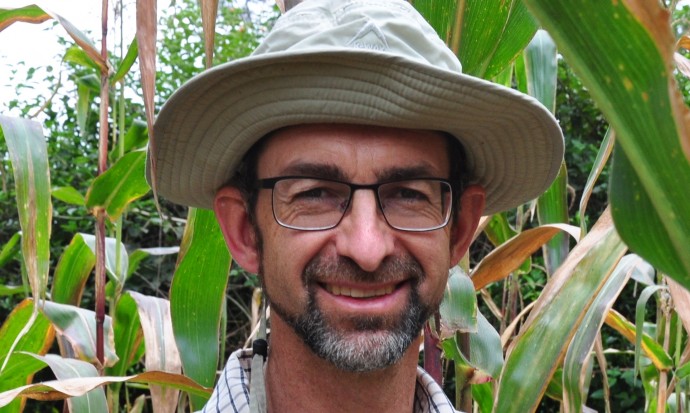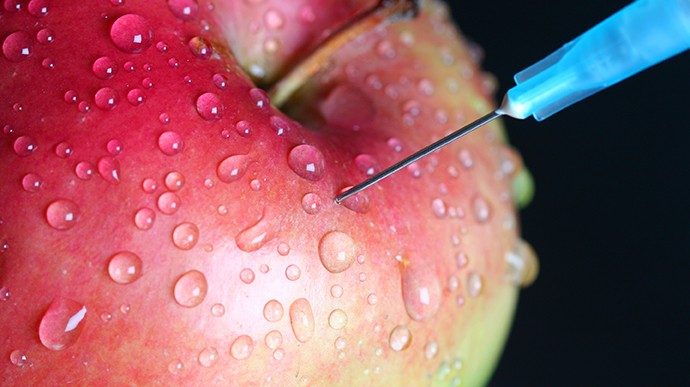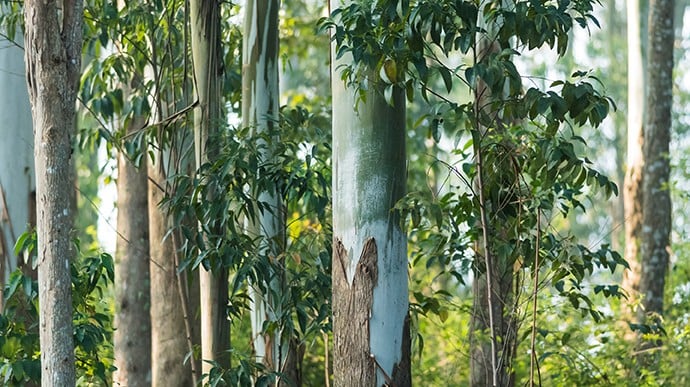Professor Dave Berger has been a researcher at the University of Pretoria’s (UP) Forestry and Agricultural Biotechnology Institute (FABI) since 2000. He obtained his undergraduate degree and a PhD in Microbiology from the University of Cape Town.
Prof Berger says UP has an excellent environment for researchers working in the general area of plant biotechnology. He attributes this to strong foundations in the plant sciences and genetics, and the critical mass of research groups and postgraduates at FABI and linked departments.
“This is a multidisciplinary environment where in one student seminar session there can be conversations about diverse topics, such as gene-editing insects, the physiology of sunflowers and the countrywide surveillance of maize fungal diseases,” he says.
Prof Berger leads the Molecular Plant-Pathogen Interactions research group at FABI. His research is focused on leaf diseases of a staple crop, maize. “My ‘model’ pathosystem is grey leaf spot disease, which is caused by the fungus Cercospora zeina. The disease is widespread globally, but is a particular threat to smallholder farmers in sub-Saharan Africa. My research group aims to understand both Cercospora pathogenicity and maize host resistance at the molecular level.”
As to how his field of research contributes to improving society, Prof Berger says that crop diseases are a major threat to food security and can spread in a way that is similar to the way the SARS-CoV-2 virus circulates among people. Plant pathologists are on the frontline of monitoring the distribution and spread of crop pathogens, he adds.
One such example is the fungus that Prof Berger’s research group is working on, Cercospora Zeina, which causes grey leaf spot disease throughout sub-Saharan Africa, and is also found in the Americas and Asia. Severe infections can result in a farmer losing most of their maize crop.
“Our research leads to better disease control by, for example, breeding for resistance to the pathogen strains in a country, or developing novel control measures by understanding how the pathogen causes disease at the molecular level. Plant pathology research is critical to meeting the Sustainable Development Goals of zero hunger and no poverty.”
Over the past 18 months, Prof Berger and his research group have completed a surveillance study of the fungal pathogen that causes grey leaf spot disease in five countries in sub-Saharan Africa. They conducted genetic analyses of 1 000 isolates to test hypotheses about the origin of the pathogen in Africa.
“We concluded that it is unlikely that there was a single introduction of the pathogen into Africa. We found country-specific patterns of diversity; for example, the Zambian population was the most distinct.”
Part of the project included presenting a workshop on disease identification in western Kenya for local researchers and students. Prof Berger was involved as a co-supervisor of one of the students, who completed his MSc this year at Maseno University in Kenya.
Prof Berger and his team are also involved in a cross-faculty research project in which researchers are using artificial intelligence for maize disease diagnosis based on images of symptoms on maize leaves. His team is working with Prof Nelishia Pillay of the Department of Computer Science in the Faculty of Engineering, Built Environment and Information Technology.
“We have also teamed up with a local company to use their app for collecting maize disease images with accurate meta-data for future use in developing digital plant pathology solutions,” he says.
Prof Berger says he is inspired and excited to be a biological scientist at the time of “DNA and genomes, where technical innovations are affording us new ways to explore nature at many levels, from ecosystems to single cells”.
He adds that his PhD supervisors, Prof Dave Woods and the late Prof Doug Rawlings, played seminal roles in establishing molecular biology in the South African research landscape. “They were inspiring leaders who created cohesive research environments, and they were excellent scientists in their own right.”
Molecular biologists generally dream of “discovering” a novel gene or molecular mechanism which describes a biological activity for the first time. In the field of molecular plant pathology, identifying a novel plant disease resistance gene and describing its function is one of those dreams. “We have come close to identifying a maize gene that could confer basal disease resistance against grey leaf spot disease, but much work is still needed to nail this down,” he says.
His research matters, Prof Berger, says because achieving food security is a major challenge to the global population. His team’s research in plant pathology is geared towards controlling crop pathogens and developing crops that can yield better on less land.
“Many disease problems are region-specific and so there is a need for local expertise and trained researchers who think globally but act locally. The postgraduate and postdoctoral students in my research programme gain experience in high-tech experiments in the laboratory, but also spend time on field trips interacting with farmers. This makes them work-ready for real-world challenges.”
Molecular plant pathology is best suited to people who like to work precisely in a laboratory and analyse data, Prof Berger says. “However, computer boffins can also work in the field as bioinformaticians. Their research involves exploring big data from pathogen and plant genome sequencing, and linking this to the biology of the plant disease.”
His advice to learners who are interested in his field is to start building the habit of studying with discipline while still at school, and to cultivate their curiosity. “Go out into the bush: observe, measure and celebrate the natural world,” he says. “Learn to do computer programming. During your undergraduate studies, read widely, ask a lot of questions in class, search for practical experience – volunteer for lab work or fieldwork. Don’t neglect statistics, and learn how to use computer platforms such as RStudio.”
In his spare time, he enjoys hiking, mountain biking, nature photography, botanising and birdwatching.

 Talking Point
Talking Point
 Story
Story
Get Social With Us
Download the UP Mobile App